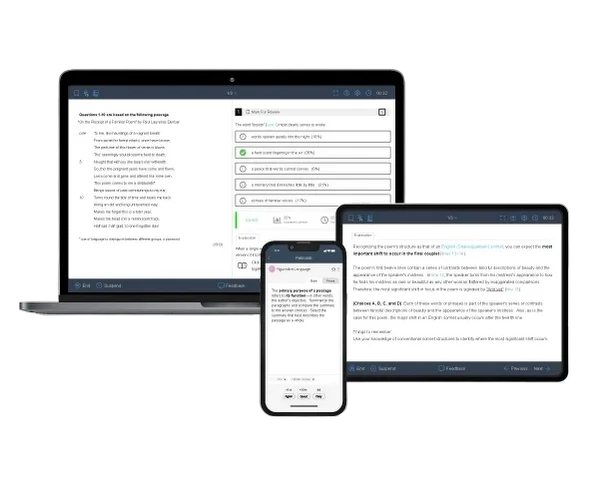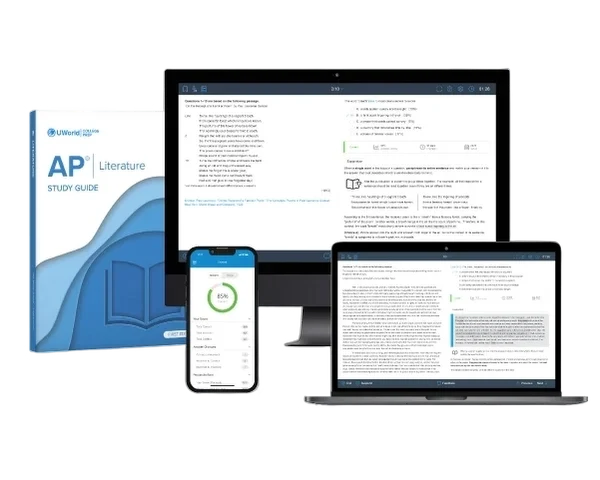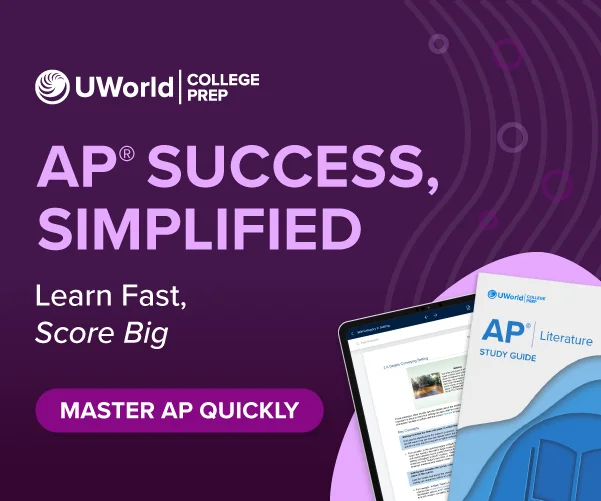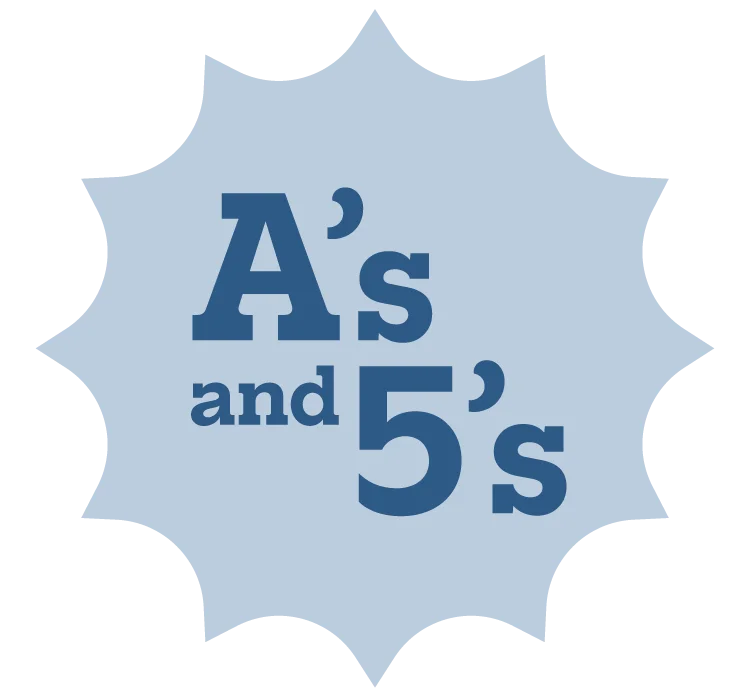There are 3 types of free-response questions (FRQs) on the AP® Lit exam: a poetry analysis, a prose fiction analysis, and a literary argument. You'll have 2 hours to complete all 3 questions, giving you around 40 minutes on each. Essay answers are scored on a scale of 0 to 6 and equally weighted, with the entire writing section counting for 55% of the exam score.
How to Answer AP English Literature Free-Response Questions
Here are some general tips for approaching the AP Lit FRQs:
-
Review all prompts before starting.
Look over all the prompts before starting. Begin with the easiest question to boost your confidence. Many students prefer to save the poetry question for last, allowing extra time for this more challenging essay.
-
State your thesis in the introduction.
Your thesis should provide a defensible interpretation, not merely a summary or restatement of the prompt. It should express the main idea derived from the passage or poem that addresses the prompt’s focus. Keep it concise — 2 or 3 sentences are sufficient. If running out of time, prioritize writing a thesis for each essay to ensure you earn at least one point.
-
Understand "complex" in a prompt means “more than one.”
When you analyze a character's complex reaction to events, show 2 different reactions. If needed, discuss a character's complex relationship to something. Write about 2 sides of the relationship, – past and present, love and hate, etc.
-
Use textual evidence to support your interpretation.
To score well, include quoted or paraphrased proof of all of your ideas in your essay. Focus on specific words and details that support what you have to say. Be sure to explain how the evidence illustrates your idea. Two pieces of evidence for each of your points are sufficient. Only include lists of quotes if they explain how they support your interpretation.
-
Write a conclusion, but only if you have time.
You do not need a conclusion to earn a high score. However, if you have time to write a sentence that pulls your ideas together at the end to make your essay sound finished, you should write one.
-
Focus on the writing, not spelling, punctuation, and grammar.
The graders understand that you are writing under time pressure and that your essay is more like a rough draft. If you make a mistake or change your mind, draw a line through the mistake and keep going.

AP English Literature and Composition FRQ Examples
Here are some examples of AP Lit FRQs from past exams to illustrate the questions you may see. These come directly from the College Board® course description guide and are ideal to use for practice.
FRQ 1 presents students with a poem of approximately 100 to 300 words. Here’s how you can expect it to look:
Example 1
In the following poem by Ralph Waldo Emerson (published in 1867), the speaker reflects on the process of growing older. Read the poem carefully. Then, in a well-written essay, analyze how Emerson uses poetic elements and techniques to convey the speaker’s complex perspective on aging.
In your response, you should do the following:
Select and use evidence to develop and support your line of reasoning.
Explain the relationship between the evidence and your thesis.
Use appropriate grammar and punctuation in communicating your argument.
Terminus*
It is time to be old,
To take in sail:—
The god of bounds,
Who sets to seas a shore,
Came to me in his fatal rounds,
And said: “No more!
No farther shoot
Thy broad, ambitious branches, and thy root.
Fancy departs: no more invent;
Contract thy firmament
To compass of a tent.
There’s not enough for this and that,
Make thy option which of two;
Economize the failing river,
Not the less revere the Giver,
Leave the many and hold the few.
Timely wise accept the terms,
Soften the fall with wary foot;
A little while
Still, plan and smile,
And,—fault of novel germs,—
Mature the unfallen fruit.
Curse, if thou wilt, thy sires,
Bad husbands of their fires,
Who, when they gave thee breath,
Failed to bequeath
The needful sinew stark as once,
The Baresark** marrow to thy bones,
But left a legacy of ebbing veins,
Inconstant heat and nerveless reins—
Amid the Muses, left thee deaf and dumb,
Amid the gladiators,*** halt and numb.”
As the bird trims**** her to the gale,
I trim myself to the storm of time,
I man the rudder, reef the sail,
Obey the voice at eve obeyed at prime:
“Lowly faithful, banish fear,
Right onward drive unharmed;
The port, well worth the cruise, is near,
And every wave is charmed.”
*the Roman god of boundaries
**A Baresark was an ancient Scandinavian warrior who fought without armor, was frenzied in battle, and
was thought to be invulnerable.
***In ancient Rome, gladiators fought to the death for the public’s entertainment.
****adjusts
Source: College Board
Here are 5 tips to write a quality response to the Poetry Analysis question:
- Read the poem and paraphrase the sentences, not the lines. This will help you understand the message of the poem better. Look at how specific words, images, details, and contrasts contribute to the poem’s meaning.
- Write a defensible interpretation. You do not have to list 2 or 3 literary devices or techniques in your thesis to receive the point for the thesis.
- Write convincingly on 2 or 3 devices. Don't worry about knowing all the literary devices. You will not impress the grader if you try to write about all of them in the passage.
- Organize your essay by the structure of the poem. Jumping around may make your writing seem disorganized. Essays that follow the passage’s organization tend to score higher than those that devote each paragraph to 1 literary device.
- Embed shorter quotes into your sentence structure when citing evidence. Blend the evidence with your commentary. This is more sophisticated and ensures you aren't just writing long quotes with no commentary.
FRQ 2 presents you with a prose fiction passage of approximately 500 to 700 words and may look like this:
Example 2
The following excerpt is from the novel Lucy by Caribbean-American author Jamaica Kincaid, published in 1990. In this passage, the narrator describes the beginning of a new phase in her life. Read the passage carefully. Then, in a well-written essay, analyze how Kincaid uses literary elements and techniques to portray the complexity of the narrator’s new situation.
In your response, you should do the following:
Select and use evidence to support your line of reasoning.
Explain how the evidence supports your line of reasoning.
Use appropriate grammar and punctuation in communicating your argument.
I got into an elevator, something I had never done before, and then I was in an apartment and seated at a table, eating food just taken from a refrigerator. In the place I had just come from, I always lived in a house, and my house did not have a refrigerator in it. Everything I was experiencing—the ride in the elevator, being in an apartment, eating day-old food stored in a refrigerator—was such a good idea that I could imagine I would grow used to it and like it very much, but at first, it was all so new that I had to smile with my mouth turned down at the corners. I slept soundly that night, but it wasn’t because I was happy and comfortable—quite the opposite; it was because I didn't want to take in anything else.
That morning, the morning of my first day, the morning that followed my first night, was a sunny morning. It was not the sort of bright sun-yellow making everything curl at the edges, almost in fright, that I was used to, but a pale-yellow sun as if the sun had grown weak from trying too hard to shine; but still it was sunny, and that was nice and made me miss my homeless. And so, seeing the sun, I got up and put on a dress, a gay dress made out of madras cloth—the same sort of dress that I would wear if I were at home and setting out for a day in the country. It was all wrong. The sun was shining, but the air was cold. It was the middle of January, after all. But I did not know that the sun could shine and the air remains cold; no one had ever told me. What a feeling that was! How can I explain? Something I had always known—the way I knew my skin was the color brown of a nut rubbed repeatedly with a soft cloth, or the way I knew my own name—something I took completely for granted, “the sun is shining, the air is warm,” was not so. I was no longer in a tropical zone, and this realization now entered my life like a flow of water dividing formerly dry and solid ground, creating two banks, one of which was my past—so familiar and predictable that even my unhappiness then made me happy now just to think of it—the other my future, a gray blank, an overcast seascape on which rain was falling and no boats were in sight. I was no longer in a tropical zone and I felt cold inside and out. It was the first time such a sensation had come over me.
In books I had read—from time to time when the plot called for it—someone would suffer from homesickness. A person would leave a not very nice situation and go somewhere else, somewhere a lot better, and then long to go back to where it was not very nice. How impatient I would become with such a person, for I would feel that I was in a not very nice situation myself, and how I wanted to go somewhere else. But now I, too, felt that I wanted to be back where I came from. I understood it; I knew where I stood there. If I had to draw a picture of my future, then it would have been a large gray patch surrounded by black, blacker, blackest.
What a surprise this was to me, that I longed to be back in the place that I came from, that I longed to sleep in a bed I had outgrown, that I longed to be with people whose smallest, the most natural gesture would call up in me such a rage that I longed to see them all dead at my feet. Oh, I had imagined that with my one swift act—leaving home and coming to this new place—I could leave behind me as if it were an old garment never to be worn again, my sad thoughts, my sad feelings, and my discontent with life in general as it presented itself to me. In the past, the thought of being in my present situation had been a comfort, but now I did not even have this to look forward to, and so I lay down on my bed and dreamt I was eating a bowl of pink mullet and green figs cooked in coconut milk,* and my grandmother cooked it, which was why the taste of it pleased me so, for she was the person I liked best in all the world and those were the things I liked best to eat also.
* a Caribbean seafood dish
**"Poor Visitor" from LUCY: A NOVEL by Jamaica Kincaid. Copyright © 1990 by Jamaica Kincaid. Reprinted by ***permission of Farrar, Straus, and Giroux, LLC.
****"Poor Visitor" from LUCY: A NOVEL by Jamaica Kincaid. Copyright © 1990 by Jamaica Kincaid, reprinted throughout the U.K. and British Commonwealth with permission by The Wylie Agency, LLC. All rights reserved.
Source: College Board
Here are 5 tips to write a quality response to the Prose Fiction Analysis question:
- Read the prose and take note of the important pieces of information the author is trying to convey.
- Draft a defensible interpretation of the passage.
- Follow the sequence of the narrative while drafting your essay. It should be concise, with a good introduction, a body, and a solid conclusion stating your analysis.
- Refrain from investing time in literary devices or jargon. Focus on 1 or 2 literary devices and explain them in-depth with examples.
- Try to use sentences from the text as quotes to support your analysis or claim. That’s extra brownie points and shows your understanding of the passage.
FRQ 3 presents a literary concept or idea and a list of around 40 works. You will select a prose fiction work from the list or your reading to analyze how the concept contributes to the work's overall interpretation. Responses should use high-quality literature, similar to their AP class readings. Here’s a sample question:
Example 3
In many works of literature, characters who have been away from a home return and find that they no longer have the same feelings about home as they once did. As novelist James Agee writes in A Death In The Family, "You can go home, it's good to go home, but you never really get all the way home again in your life."
Either from your own reading or from the list below, choose a work of fiction in which a character's return home is problematic: "home" is not what it once was perceived to be. Then, in a well-written essay, analyze how the character’s response to his or her "home" contributes to an interpretation of the work as a whole. Do not merely summarize the plot.
In your response you should do the following:
Select and use evidence to develop and support your line of reasoning.
Explain the relationship between the evidence and your thesis.
Use appropriate grammar and punctuation in communicating your argument.
- The Age of Innocence
- Americanah
- The Bell Jar
- The Bonesetter’s Daughter
- Breath, Eyes, Memory
- Brighton Beach Memoirs
- Ceremony
- Cold Mountain
- Death of a Salesman
- Exit West
- Great Expectations
- Gulliver’s Travels
- Home
- Homegoing
- The Hummingbird’s Daughter
- Kindred
- The Kite Runner
- Lonely Londoners
- The Mambo Kings Play Songs of Love
- Mansfield Park
- The Mill on the Floss
- Mrs. Dalloway
- My Ántonia
- The Namesake
- Native Son
- Paradise Lost
- The Piano Lesson
- The Poisonwood Bible
- Pudd’nhead Wilson
- Pygmalion
- Quicksand
- The Return of the Native
- The Scarlet Letter
- Song of Solomon
- Sons and Other FlammableObjects
- The Sound and the Fury
- The Tempest
- Their Eyes Were Watching God
- Where the Dead Sit Talking
- Wuthering Heights
Source: College Board
Here are 2 tips to write a quality response to the Literary Argument question:
- Make sure you are thoroughly familiar with at least 3-5 novels or dramas. It might be helpful to read summaries online to refresh your memory of the characters, key events, conflicts, settings, etc.
- The grader likely has read the novel/drama you have chosen. You do not need to summarize large quantities of details. Summarize only the important details needed to support your claim. This will keep you from wasting precious time on optional details.
How Can UWorld Help
The best way to practice for the AP English Literature and Composition FRQs is to use released questions from the College Board's previous exams.
If you are taking the AP English Lit class, your teacher will help you learn how to write effective FRQ responses throughout the year and give you feedback on your writing. However, if you want to practice on your own, explore released questions, sample student responses, and explanations of their scores on the College Board website.
To enhance your preparation, consider enrolling in UWorld's AP English Literature Online Prep Course. These courses provide structured lessons, practice questions, and expert feedback to improve your writing skills.
Additionally, practice regularly with UWorld's AP English Literature Practice Questions to sharpen your ability to analyze passages, develop strong theses, and organize your essays effectively. Be sure to study the rubrics used by graders to understand the expectations for high-scoring essays and the amount of information you should include in your responses.
For comprehensive guidance, refer to an AP English Literature Study Guide. It can help you understand key literary concepts, familiarize yourself with common exam themes, and refine your analytical techniques.
Practice writing essays at a slower pace at first to learn how to express your ideas skillfully. Gradually reduce your time on each practice essay until you can write a good essay in 40 minutes.

Frequently Asked Questions (FAQs)
How many FRQs are on the AP English Literature exam?
There are 3 FRQs on the AP English Literature and Composition exam: poetry analysis, prose fiction analysis, and literary argument. The exam will present the FRQs in this order.
How are AP English Literature FRQs graded?
AP English Literature is now a fully digital exam completed in the Bluebook app. FRQs are scored by experienced high school AP Lit teachers and college professors using detailed rubrics that prioritize idea quality over grammar or spelling at the annual AP Reading held during the first 2 weeks in June.
How long is the FRQ section of the AP English Literature exam?
You have 2 hours to complete AP Lit FRQs, which allows 40 minutes per essay. However, you can use more or less time on each essay if they choose to do so.
Where can I get past AP English Literature FRQs?
Past FRQs are available on the AP Central website.
References
- (2024). AP® English Literature and Composition Course and Exam Description. College Board. Retrieved on January 16, 2025 from https://apcentral.collegeboard.org/media/pdf/ap-english-literature-and-composition-course-and-exam-description.pdf
Read More About the AP English Literature
Answering MCQs appears simple, but the correct answer can differ by a small margin! Learn effective strategies to pick the right answer for AP English Lit MCQs.
AP English Literature Study Plan & TipsNeed a perfect study plan for the AP English Lit? Use these strategies and resources to build your skills, manage your time and achieve a top score on the exam.
AP English Literature Exam FormatDon’t let the AP English Literature exam format confuse you! Discover the structure, question types, scoring system and all the essential details about the exam.
Best AP English Literature Study Guide ComparisonCompare the best AP English Literature study guides! See how Kaplan, Barron's, and Princeton Review stack up against UWorld for comprehensive exam prep.
Best AP English Literature Prep Course ReviewDiscover the best AP Literature prep courses available. Compare key features, pricings, reviews, and benefits to select the course that best fits your learning.
How to Self-Study for AP English LiteratureWant to ace AP English Literature on your own? Follow this expert self-study guide with tips, tricks, and tools to prepare effectively for the exam.




